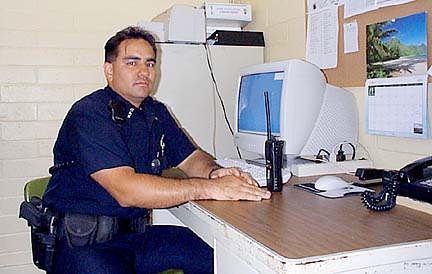


|
Campus cop program LIHUE >> When a police car was parked in front of a school, people would wonder what had happened, said Kauai High School Principal Linda Smith.
draws applause
A new program that stations
a police officer at Kauai high
schools helps catch trouble earlyBy Anthony Sommer
tsommer@starbulletin.com"Now, there's a police car parked there all day every day, and after only a couple of weeks, it has become part of the daily routine," Smith said. "We treat the police officer as part of our staff."
The Kauai Police Department has finished the third week of its Cops in the School program, which assigned an officer full time to each of the island's three high schools. Police and school officials already are declaring it a success.
Maui is the only other district to have a similar program. Alan Ashitomi, one of Maui's two superintendents, said the program has been well accepted there, but the emphasis is more on serving as a "resource" or adviser to the school than in a law enforcement role.
Kauai's Cops in the School program is part of a federally funded national effort. It is a reflection of increasing violence in schools across the country. Kauai County received $500,000 to pay for three officers and a supervisor over the next three years.
Police Sgt. Dan Miyamoto, one of the most experienced patrol officers in the department, put the program together with the support of Chief George Freitas.
The three officers -- Paul Applegate at Kauai High School, Mark Ozaki at Kapaa High School and James Rodriguez at Waimea High School -- all are volunteers. The trio and Miyamoto attended a special course for officers assigned to schools.
Each of Kauai's high schools has a distinctive personality. Waimea, on the island's west side, is the most traditional, with the vast majority of students from working-class families. The school has a reputation for respectful students.
Kauai High in Nawiliwili is much more middle class. The kids are friendly and trendy. A visitor to the campus is likely to be addressed -- politely -- as "dude."
Kapaa High is the melting pot where local kids from the island's east side mix with upper middle-class students, many of them white, from the North Shore. Racial tension is not unusual.
The early experience of the officers at the Kapaa and Kauai campuses mirrors that difference. Ozaki at Kapaa has made 30 arrests in three weeks; Miyamoto at Kauai High, only five, three of them for truancy.
Although the officers do arrest students, almost all are booked and released to their parents with a citation to appear in court.
Kauai has no juvenile facilities. Serious offenders are turned over to the Department of Public Safety and flown to Oahu.
Most of the problems are brought to the police officers by campus security guards or the vice principals.
Ozaki said he is taking a big load off the local patrol officers who were spending much of their day at Kapaa High anyway.
He believes his presence already has defused a major problem at Kapaa High, which is located on a main street. Police and school officials call them "trespassers" -- nonstudents who come on the campus. In reality, he says, many are drug dealers.
Ozaki said there has been a sharp decline in "trespassing" since he came to the school full time.
He said he also is acutely aware that there is always a potential for violence and that he would be the first to respond.
"Many people don't realize what an enormous number of guns there are on this island," said Ozaki, who grew up in Waimea. "Lots of local people hunt pigs, and lots of homes have guns for hunting."
"Columbine High School (in Colorado, where two armed students went on a killing spree in 1999) was a result of not having a police officer on the campus. A similar incident in San Diego ended with no one being seriously hurt because an officer was assigned to the school.
"It will happen in Hawaii eventually. If it happens on Kauai, there will be an officer on the campus."
At Kauai High School, Applegate, who transferred from the Hawaii County Police Department, said he is receiving a generally friendly reception from students. Some are beginning to seek him out, often in situations where a friend or family member may be in danger.
"It's starting to happen," he said. "Some of it deals with issues outside of the school in their personal lives. It's exactly the kind of rapport we are seeking."